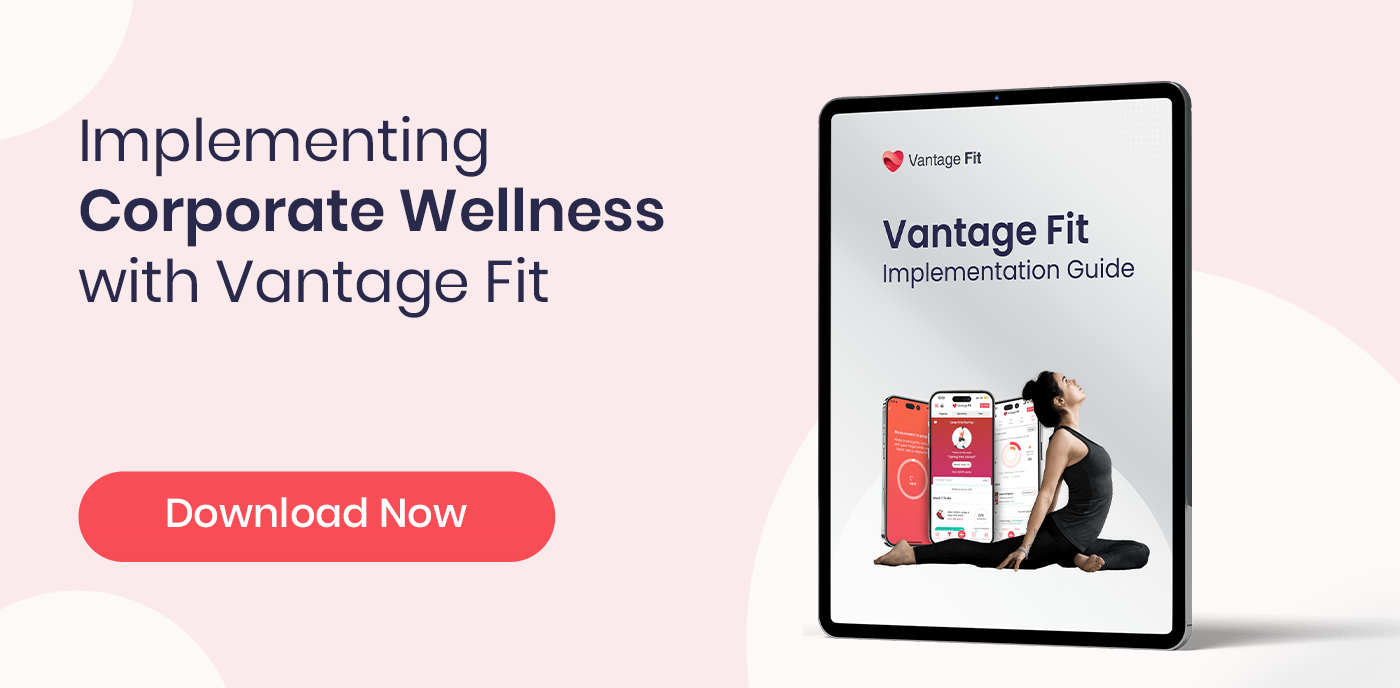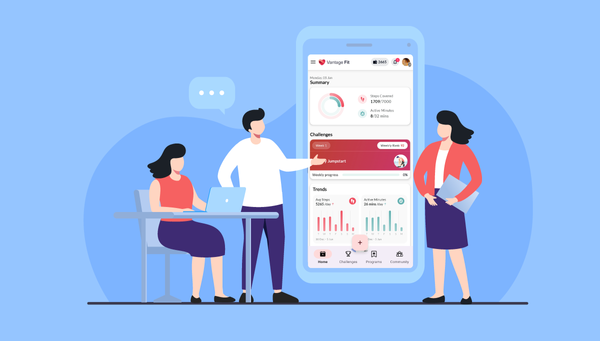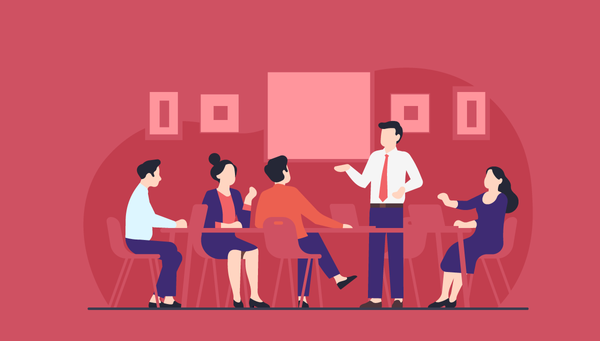Mental Health Champions in The Workplace
Let’s be honest: mental health in the workplace is no longer a luxury; it's essential. If you're an HR or wellness coordinator aiming to create a culture of true support (not just checking boxes), mental health champions could be exactly what your organization needs.
So, what are mental health champions in the workplace? Think of them as on-the-ground mental health allies: trained employees who make it easier for coworkers to discuss mental health without the awkwardness or stigma.
Don't get me wrong, they're not therapists nor HR reps. Instead, they're peers, managers, and leaders who create safe spaces, point people to the right resources, and help normalize conversations that too many workplaces still avoid.
In this blog, we will explore workplace mental health champions—their roles, the benefits for employees and organizations, and how to create an effective champion network. We've also shared innovative ideas to enhance your program.
What is A Mental Health Champion?
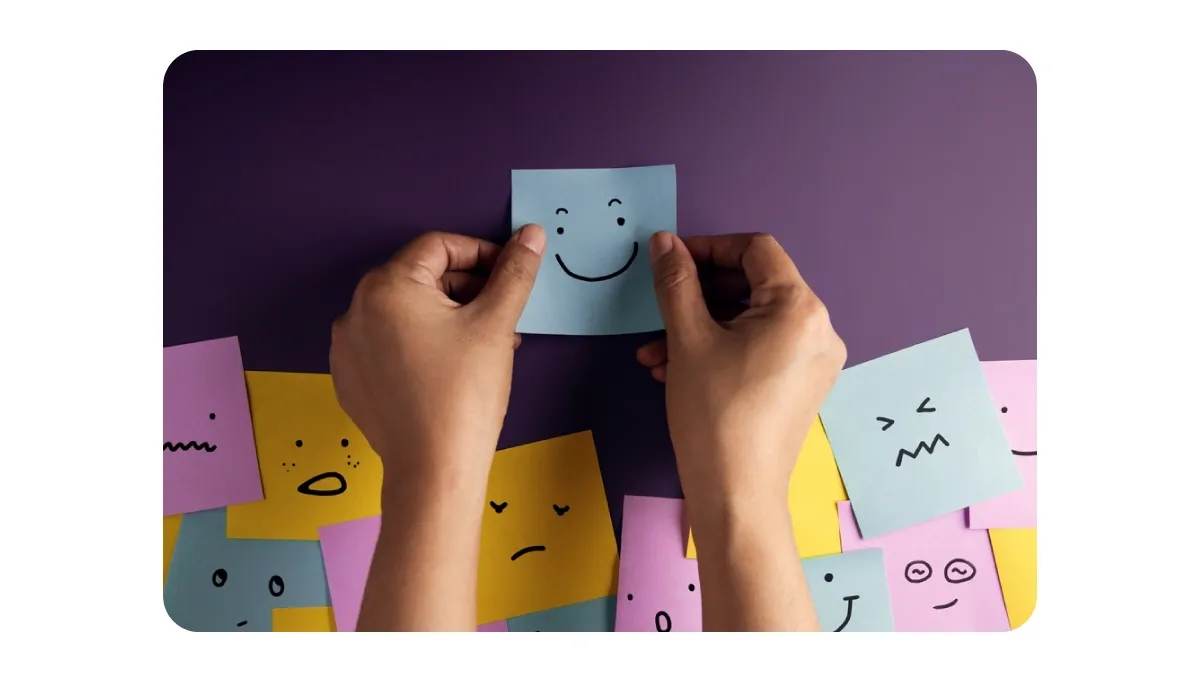
A mental health champion in the workplace is basically your go-to person when someone needs support but isn't ready to talk to HR or doesn't know where to start. They're trained employees who make mental health conversations feel less intimidating and way more human.
Here's what they actually do:
-
Listen without judgment: Sometimes people need someone to hear them out without trying to fix everything immediately.
-
Reduce stigma: By talking openly about mental health, they help make it an everyday workplace conversation (like it should be).
-
Connect people to resources: They know about your EAP, mental health benefits, crisis hotlines, and can guide employees to the right help.
-
Create safe spaces: They organize activities, facilitate conversations, and make it clear that mental health matters.
Check out our blog Mental Health Stigma in the Workplace and How to Reduce It
Now, let's set some boundaries: here’s what mental health champions in the workplace are NOT:
-
Therapists or counselors (they won't diagnose or treat anyone)
-
HR case managers (they're not handling formal complaints or performance issues)
-
Record keepers (they don't maintain health files or documentation)
Think of them as a friendly bridge between 'I’m struggling' and 'I’ve received the help I needed. " The magic of having a mental health champions network is that you've got these supportive people spread throughout your organization.
Whether someone works at HQ or remotely, they can find a champion nearby. This makes getting support feel way less formal and intimidating, which means people are more likely to reach out before minor issues become significant crises.
Types of Mental Health Champions
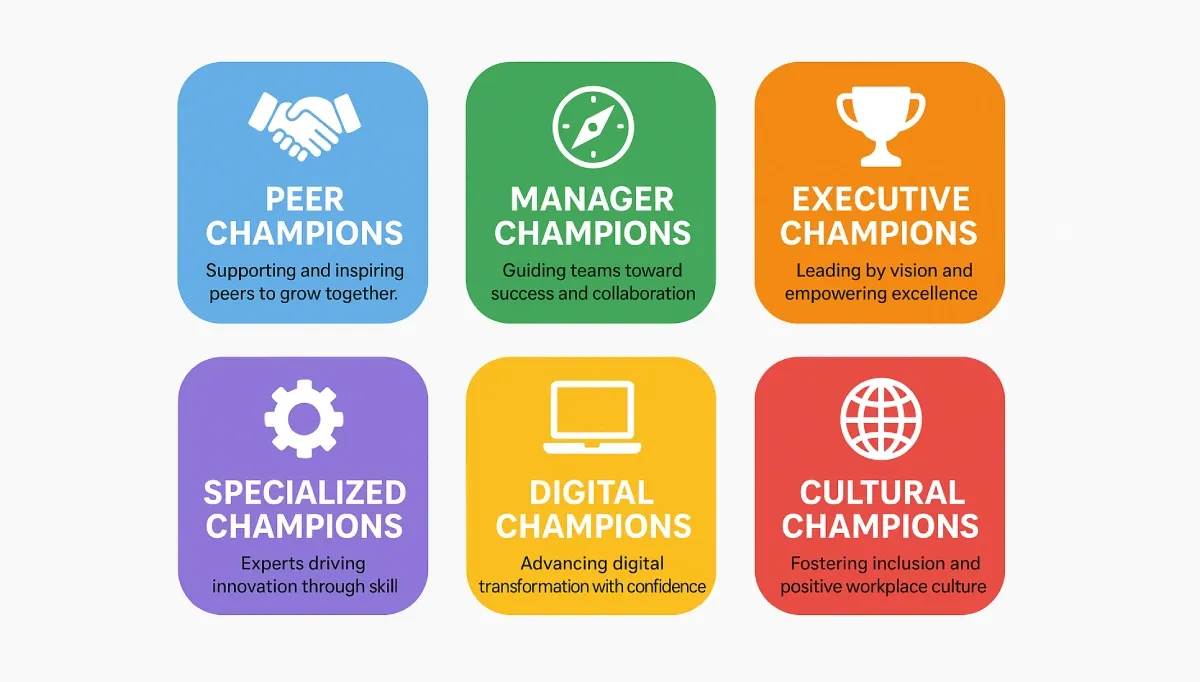
-
Peer Champions – These are front-line employees who provide colleague-to-colleague support. They organize employee wellbeing events, share resources, and create safe spaces for open conversation, free from manager-employee power dynamics.
-
Manager Champions: Team leads who've leveled up their skills to spot when someone's struggling and know how to have those supportive (not scary) conversations with their direct reports while balancing their management responsibilities.
-
Executive Champions: Your C-suite and senior leaders who walk the talk by sharing their own mental health experiences, making sure the budget and policies are there, and showing the whole company that mental health is a leadership priority.
-
Specialized Champions: Think of these folks as your mental health first responders; they've got Mental Health First Aid certification and can handle immediate distress situations while connecting people to professional help.
-
Digital Champions: Tech-savvy employees who bridge the gap between traditional support and digital wellness. They create mental health content for internal channels, manage mental health Slack/Teams channels, curate digital resources, and help remote employees feel connected to support systems.
-
Cultural Champions: Employees who bring cultural competency to mental health support, ensuring that resources and conversations are inclusive and respectful of diverse backgrounds, languages, and mental health beliefs across different cultures and communities.
Check out our blog 12 Ways You Can Support Your Team's Mental Health as a Manager
Benefits of Having Mental Health Champions
Okay, so why should you actually care about bringing mental health champions into your workplace? Because the ROI is real, and the impact goes way beyond just feeling good about it. Let's break down the benefits for both employees and employers -
For your employees:

Having mental health champions in the workplace completely changes the game. Instead of mental health being this taboo topic everyone avoids, it becomes normalized.
Your people get easier access to resources through someone who speaks their language, no HR jargon, no intimidating processes.
When employees see that their company puts actual humans in place to support them, trust goes up.
People feel safer opening up about struggles early, before they spiral into full-blown crises or burnout. And honestly? Knowing there's someone approachable to talk to can be the difference between someone suffering in silence and getting the help they need.
For your organization:

Let's talk numbers because your leadership team definitely cares about these. Companies with workplace mental health champions see reduced absenteeism. When people get timely support, they don't need extended mental health leave.
Productivity actually increases because supported employees can manage their mental health proactively instead of trying to power through until they crash.
You'll see better engagement and retention, too, because guess what? Millennials and Gen Z (who make up most of your workforce now) actively seek out employers who prioritize mental health.
Plus, your champions become this amazing feedback loop; they hear what's actually stressing people out and can help leadership make more intelligent decisions about policies and culture.
Check out our blog Supporting Gen Z Mental Health in the Workplace: A Guide for Employers
Here are a few more benefits you might not consider or have overlooked:
-
Innovation boost: Employees with good mental health are more creative and willing to take calculated risks.
-
Customer service improvement: Supported employees provide better service because they have the emotional bandwidth to care.
-
Reduced workplace conflicts: When people have outlets for stress, interpersonal tensions decrease significantly.
-
Stronger team cohesion: Vulnerability and authentic support create deeper workplace connections.
Ready to elevate your employees' mental health and productivity?
Qualities of a Good Mental Health Champion

Champions don't need personal experience with mental health challenges, although lived experience can enhance authenticity and relatability. What matters most is that they're passionate about this work and genuinely committed to improving your workplace culture.
So, who makes a great mental health champion in the workplace? You're not looking for perfect people; you're looking for the right mix of personality traits and skills. Here are some qualities of good mental champions -
-
They should have high emotional intelligence and genuine empathy. They can connect with someone who's having a rough time without making it weird or judgmental. They're the people in your office who others naturally gravitate toward because they're approachable and trustworthy.
-
Confidentiality is non-negotiable; they need to keep conversations private and create that safe space where people feel comfortable being vulnerable.
-
Listening skills are essential. Good mental health champions know to just be present and listen, versus when to gently guide someone toward professional help, and are aware of their own limits.
-
Good champions need strong communication skills to handle sensitive conversations, use language that reduces stigma, and effectively guide people to resources.
Listen to our podcast on The need for emotional intelligence in corporate leaders
-
Digital fluency is an essential quality for raising awareness about mental health and connecting with remote workers. It is necessary to be comfortable using a variety of communication platforms to reach people where they are.
-
Humor and lightness are essential qualities for a mental health champion, as they can provide levity in serious conversations without undermining the issues at hand.
It is important to remember that the best mental health champions understand they're not fixers or therapists; rather, they're supporters and connectors. They embrace continuous learning, stay up to date on available resources, and actively participate in training to keep improving at what they do.
Check out our blog 30-Day Mental Wellness Challenge: Simple Habits For A Calmer, Happier You
How To Build A Mental Health Champions Network In The Workplace?
Ready to take action? Here's your guide for building a mental health champions program that doesn’t just look good on paper but makes a real difference.
-
Define clear roles and boundaries: Write down exactly what your workplace mental health champions can do (peer support, resource navigation, hosting awareness events) and what they definitely can't do (therapy, diagnoses, formal HR stuff). Clear boundaries protect both your champions and the people they're helping.
-
Recruit diverse champions across the organization: Don't just grab volunteers from one department and call it a day. Get champions from different teams, levels, backgrounds, and locations. You want people throughout your company to see someone they can relate to.
-
Provide comprehensive initial training: Your workplace champions need real training, not just a PDF and good luck. Cover mental health basics, how to spot warning signs, active listening techniques, maintaining confidentiality, setting boundaries, what resources your company offers, and what to do in a crisis.
-
Establish ongoing support and supervision: Your champions need regular check-ins, peer support groups with other champions, access to clinical supervision when things get heavy, and ongoing learning opportunities. Otherwise, they'll burn out fast.
-
Secure leadership buy-in and resources: Get your senior leaders/ managers to publicly champion this program. Make sure champions have dedicated time during work hours for this. Provide a budget for training, materials, and recognition.
-
Create accessible communication channels: Set up ways for employees to easily find and connect with champions. You can have a champions directory on your intranet, a dedicated Slack channel, or regular office hours. Make it brain-dead simple to get support.
-
Develop a Champion Signature: Create distinctive visual branding (pins, desk flags, email signatures, virtual backgrounds) so champions are instantly recognizable. This reduces the barrier of "I don't know who to talk to."
-
Implement a Buddy System for Champions: Pair up champions so no one carries the load alone. Each champion has another champion they can debrief with, process difficult conversations with, and share responsibility with.
13 Creative Activity Ideas for Mental Health Champions
Workplace champions create ongoing touchpoints for mental health conversations and community. Here are some creative ways they can lead:
Traditional High-Impact Activities
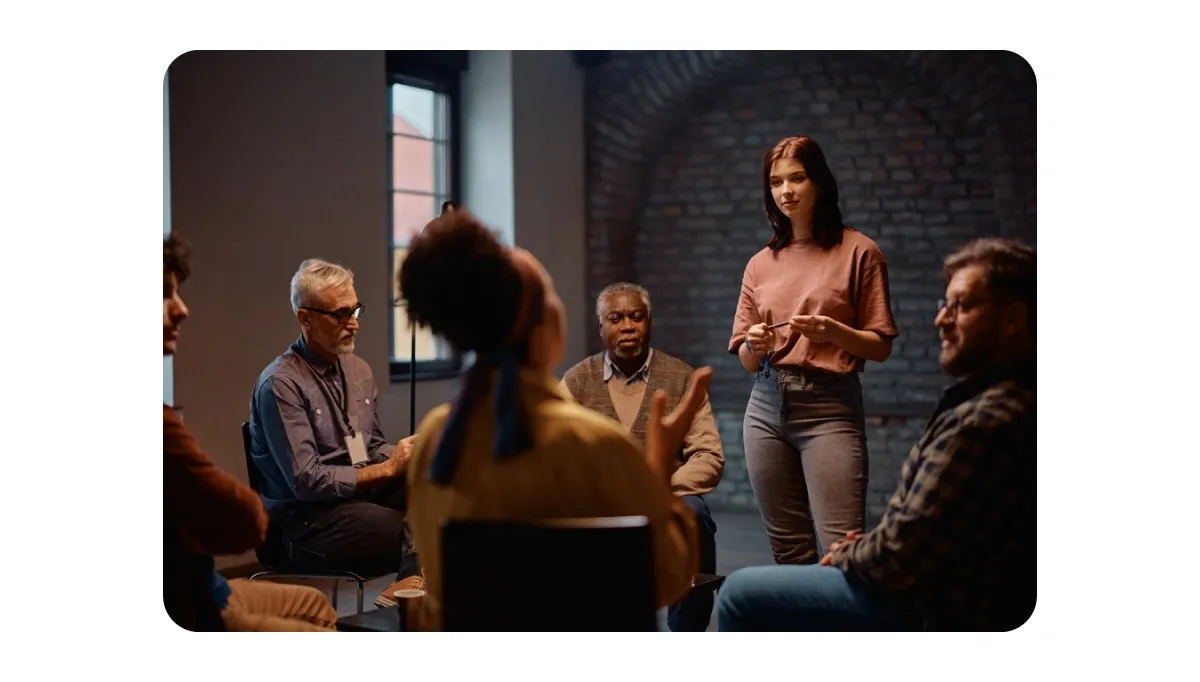
-
Mental health awareness campaigns: Champions coordinate Mental Health Awareness Month activities, share educational content, and host events. The consistency matters; when mental health becomes part of your regular rhythm, the stigma naturally fades.
-
Wellbeing workshops and lunch-and-learns: Simple topics like stress management techniques, improving sleep habits, or recognizing burnout. Keep them interactive and practical, not lecture-y. People want tools they can use.
-
Peer support groups: Create safe spaces for employees dealing with similar challenges, working parents, people with chronic illness, and LGBTQ+ employees. Sometimes just knowing you're not alone is everything.
-
Resource fairs or wellness expos: Bring together everything your company offers, such as EAP providers, gym memberships, meditation apps, and local therapists. Many employees have no idea what benefits they actually have access to.
-
Mindfulness sessions or meditation breaks: Short guided sessions during the workday. Even 10 minutes of breathing exercises can reset someone's whole afternoon.
-
Workplace environment assessments: Have your workplace mental health champions work with teams to identify stressors in the actual environment, such as noise levels, lighting, workspace design, and tight meeting schedules and push for changes.
Innovative Creative Activities

-
Mental Health Minute Video Series: Champions can create short, authentic video clips sharing quick tips, personal stories, or resource highlights. Post them on internal channels with captions for accessibility. Make them casual and relatable, not corporate and stiff.
-
Walking Meetings for Wellbeing: Champions organize optional walking meetings or "step sync" sessions where colleagues discuss mental health topics while moving. Physical activity + conversation can be a powerful combo for both mental and physical health.
-
Ask Me Anything Sessions: Monthly AMAs where champions answer anonymous questions about mental health, resources, and wellbeing submitted via online form. Creates a judgment-free zone for people to get information they're too nervous to ask about directly.
-
Wellbeing Passport Program: Create a fun "passport" where employees earn stamps for trying different mental health games (attending a workshop, trying meditation, using a mental health day, etc.). Gamification makes engagement feel lighter and more accessible.
-
Stress Less Challenge: Monthly challenges where champions encourage everyone to try specific stress-reduction techniques together (journaling for 5 minutes daily, digital detox hours, gratitude practice). Share experiences in a dedicated channel.
-
Feelings Weather Report: Start team meetings by having everyone share their emotional "weather" (sunny, cloudy, stormy, etc.). A simple metaphor can make check-ins less intimidating than asking "how are you feeling?" You can even encourage your employees to use an app with features like a mood meter to log their mood daily.
-
Stress First Aid Kit Initiative : Champions create physical or digital stress kits with resources (breathing exercises, affirmations, hotline numbers, funny videos) that managers can share with struggling team members.
Summing it Up
Mental health champions in the workplace represent a grassroots approach to wellbeing that works. When you do it right, with proper training, clear boundaries, and real support systems, you can transform your workplace culture from one where people suffer in silence to one where they feel safe asking for help.
As workplaces keep evolving and mental health continues moving from taboo to table stakes, your champions will be the ones making sure nobody has to navigate their struggles alone.
With the right strategies and technological tools, you're not just launching a program, you're starting a movement.
And honestly, that’s powerful.
Ready to transform your workplace culture? Start with one champion, one conversation, one employee at a time. The ripple effects will amaze you.? Check our corporate mental health programs guide.
FAQS
1. What is a Mental Health First Aid Champion?
A trained employee who provides initial support to colleagues experiencing mental health challenges and guides them to appropriate resources.
2. When should employees contact a Mental Health Champion vs. EAP or other services?
Contact a Mental Health Champion for informal support and guidance. Reach out to EAP or professional services for clinical help during a mental health crisis or for therapy.
3. How to compensate or recognize Champions fairly?
Recognize champions with formal acknowledgment, bonuses, extra leave, or career development opportunities. Provide time during work hours for their role.
4. Workplace Mental Health Champions: Risks and Practical Recommendations.
Risks include role ambiguity, confidentiality concerns, and burnout. Mitigate by clearly defining roles, providing regular training, offering support, and gathering feedback.



